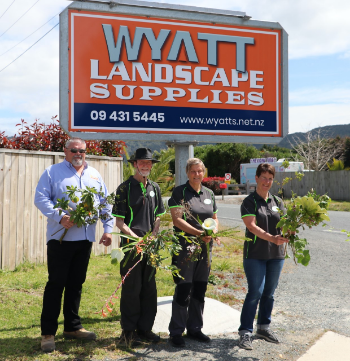Home > Archives > 19th October 2020 Issue > Free weed bin encourages community effort tackling plant pests

MANGAWHAI'S NO.1 NEWSPAPER
|
|
|
Free weed bin encourages community effort tackling plant pests
Issues of what to do regarding a prolific weed has dominated headlines recently, however for locals whose garden may be harbouring unruly and harmful weeds of a different variety, you will soon be able to dispose of them for free. Located at Wyatt Landscaping Supplies on Mangawhai Heads Road, the free weed disposal bin is for anyone who has a patch of invasive weeds with the potential to ‘jump the fence’ and endanger native bush and wildlife. Open from Labour Weekend to the end of November, the free bin is the initiative of Weed Action Piroa Brynderwyn (WAPB) in support of the local environment WAPB coordinator Sara Brill says the bin is to make it easier for people to tackle invasive plants, which were often planted in old gardens, and to sow awareness of their potential harm. “In older coastal settlements like Mangawhai there’s a lot of ladder fern, boneseed, lantana, wild jasmine… some people probably don’t realise they are invasive weeds and are a threat to the Brynderwyn’s flora, fauna and birdlife,” she says. “If people have a couple of trailer loads of golden wattle to get rid of, that’s going to set them back quite a bit and they’ll leave it, but if its free, they might think ‘let’s rip into that ginger or agapanthus.” Once full, Northland Waste will transport the bin to their hot compost system near Whangarei, where the plants are mulched before being composted. “Not all invasive weeds are welcome however, bamboo, cabbage trees, flaxes and palm leaves are banned as the plants tend to clog up the mulcher and slows down the operation,” Brill says. “The bin is also not for weeds from around kauri trees because of the risk of spreading kauri dieback, or lawn clippings and unwanted plants.” WAPB also encourages people to become ‘Weed Warriors’ – community-led neighbourhood groups who tackle invasive growth nearby gardens, reserves or ‘a place they would like to see improve’. “I often put signs up around the area saying ‘Weed Warriors Wanted’, and quite a few people have put up their hands and got involved,” she says. “It’s encouraging to see just how much work can be achieved by just by a couple of people from an afternoon or a few hours in the weekend.” Current local groups include Cove Road, Pearson Street and Breve Reserve, and as coordinater, Brill liases with KDC and the groups, supplying herbicides, advice of removal or treatment methods as well as overseeing health and safety aspects. “We aim for at least one person per group to have a current first aid certificate and a Growsafe certificate.” Weed Warriors also have the extra benefit of ‘social capital’, a term given to the increased interaction, trust and neighbourly support, enhanced when people in the community work together on a common project. “Such interaction is very positive, brings people together, makes them feel good about where they live and safe in knowing who their neighbours are.” Knowledge and awareness of the impact some plants have on the country’s natural environment, has come a long way from earlier years when various invasive weeds could be bought from a nursery and even featured in gardening publications Brill says. “All of these plants were brought into New Zealand; on one of the front covers of a 1975 ‘New Zealand Gardener’ magazine, ginger was promoted as the answer to having autumn colour in your garden… people were selling and making money out of these weeds,” she says. “Thankfully many of them are no longer allowed to be sold, propagated or distributed anymore, it is even illegal to give your neighbour a strand of wild jasmine.” New Zealand’s 2000 species of natives are eclipsed by the approximately 30,000 exotic species growing nationwide, with 300 types classed as seriously invasive, ‘and the plants jumping the fence is increasing’. While jasmine and morning glory do not have seeds so can be more easily contained, in contrast, ginger and climbing asparagus are much more harmful as birds eat the berries and disperse the seeds. “Such weeds then take over and often carpet the forest floor so new native seedlings will be able to come through. Without native forest, native birds will die… it’s like a long-term kill.” With many years of biosecurity experience in weed control, including seven spent in the Bay of Plenty and eight with Northland Regional Council, Brill says pulling weeds is just as vital as trapping possums and rats. “It is an ongoing battle, but if we don’t do it the weeds will take over the forest – in some places they already have – and there is no way the kiwi and other birds will survive if they don’t have a flourishing native forest habitat,” she says. “A couple of bio-security officers can’t do it alone, the weeds are going to beat us if we don’t have the community support, so let’s take the opportunity now to do something before it gets too late.” A free booklet with plants listed as ‘weedy’ is also available at Wyatts. Teaming up for the war against weeds, from left, Pat Neems of Wyatt Landscape Supplies, John Hawley WAPB committee, Sara Brill WAPB coordinator, Belinda Vernon WAPB committee. PHOTO/MEL TITO “It’s encouraging to see just how much work can be achieved by just by a couple of people from an afternoon or a few hours in the weekend.” |

 JULIA WADE
JULIA WADE
